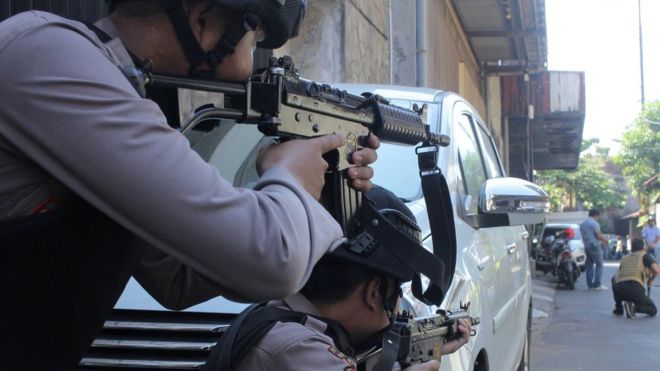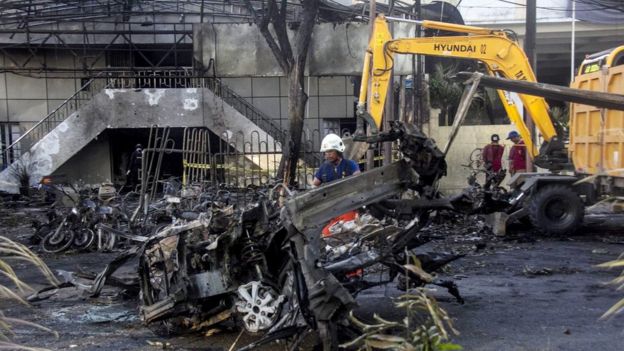Surabaya attacks: Family of five bomb Indonesia police headquarters

A suicide bombing at a police
headquarters in the Indonesian city of Surabaya on Monday was carried
out by a family of five riding on two motorbikes, police say.
An eight-year-old daughter survived the latest attack, police say.
Indonesia is the world's most populous Muslim-majority country.
The archipelago, home to 260 million people, has seen a resurgence of Islamist militancy in recent years but the scale of the attacks in Surabaya has raised fresh concerns about the potency of jihadist networks.
Video footage of the latest attack on the police headquarters shows two motorbikes approaching a checkpoint just before the blast. Six civilians and four police officers were injured, the authorities say.
The young girl who survived had been wedged between her mother and father on the motorbike as they carried out the attack. CCTV footage shows her stumbling around after the blast.
- Parents who bring their children to die
- Why is Indonesia a target for IS militants?
- Sent out to die: The young women used in militant attacks
What preceded the latest attack?
Indonesia was on high alert after bombings on Sunday by a single family targeted three churches in Surabaya, the capital of East Java province.The mother targeted one church alongside her two daughters, aged nine and 12, while the father and two sons attacked two other churches.
A 28-year-old woman had planned to bomb the Presidential Palace last year but was caught and jailed, he added.
The authorities originally said the family of six were among hundreds of Indonesians who had returned from conflict-hit Syria but have since said the family did not actually travel there.
The coordinated attacks killed 18 people, including the bombers, and injured more than 40. They were the deadliest bombings in Indonesia in more than a decade.
Police say the father, Dita Oepriarto, was the head of the local branch of Jemaah Ansharut Daulah (JAD), an Indonesian IS-inspired network.
Five bombings in two days in East Java
1. Two teenaged sons rode motorcycles into Santa Maria Catholic Church and detonated explosives at 07:30 local time (00:30 GMT)
2. The father drove a bomb-laden car at Surabaya Centre Pentecostal Church at 07:35 local time
3. A mother, with her two daughters, carried out a bomb attack on Diponegoro Indonesian Christian Church a few minutes later
There was another suspected terror-linked incident on Sunday night:
4. A bomb exploded at Rusunawa Wonocolo flats, Sidoarjo regency at around 21:00 local time
A second family carried out an attack on Monday:
5. The family of five rode motorbikes to a checkpoint at Surabaya police headquarters and detonated bombs at 08:50 local time
Separately, police said on Monday that they had arrested six people plotting attacks in Surabaya, the Jakarta Post reported.
What has the reaction been?
President Joko Widodo has described the attacks as "cowardly, undignified and inhumane" and said he will push through a long-awaited anti-terrorism bill if parliament does not pass it.The bill has faced criticism from human rights groups, but defenders say it is needed to prosecute militants returning from the Middle East.
"There will be no compromise in taking action on the ground to stop terrorism," he said.
Officials said police, backed by military forces, would increase security across the country.
Enable it in your browser or download Flash Player here.
Sorry, you need Flash to play this.
"These people are the worst of the worst. They are threatening civilised nations, they're threatening civilised way of life. They're threatening people's harmony and religion.
They are debasing and defaming Islam, as President Widodo has often said."

What is the history of militancy in Indonesia?
The South East Asian country has long struggled with Islamist militancy. Indonesia's worst ever terror attack was in Bali in 2002, when 202 people - mostly foreigners - were killed in an attack on a tourist nightlife district.That attack was carried out by the Jemaah Islamiah (JI) militant network and prompted a sustained crackdown on militants.
The first attack claimed by IS in Indonesia took place in January 2016, when four civilians and four attackers were killed in a series of explosions and shootings in central Jakarta.
IS-inspired groups have since mostly carried out "amateurish" plots but the attacks in Surabaya suggest better planning and a higher level of "technical proficiency", Zachary Abuza of the National War College in Washington DC told the BBC.
The use of children in the attacks was "absolutely unprecedented" in the region, he said, and speaks to the "ideological indoctrination" of JAD.
Who are the IS-inspired group?
By BBC Monitoring• JAD is a local network of Indonesian militants who have pledged allegiance to IS
• The group was formed in 2015 following a merger of several militant factions run by influential Indonesian cleric and convicted terrorist Aman Abdurrahman
• Abdurrahman, also known as Oman Rochman, is serving a nine-year prison sentence but is said to manage his followers, conduct recruitment and spread IS propaganda from behind bars
• JAD campaigns for a caliphate system across Indonesia and says it is "justified in using violence" to do so.
The group encourages attacks on the police, which it regards as "infidels"
• Indonesia's National Counterterrorism Agency has said that JAD is "currently the most dangerous terrorist organisation" in Indonesia









Post a Comment